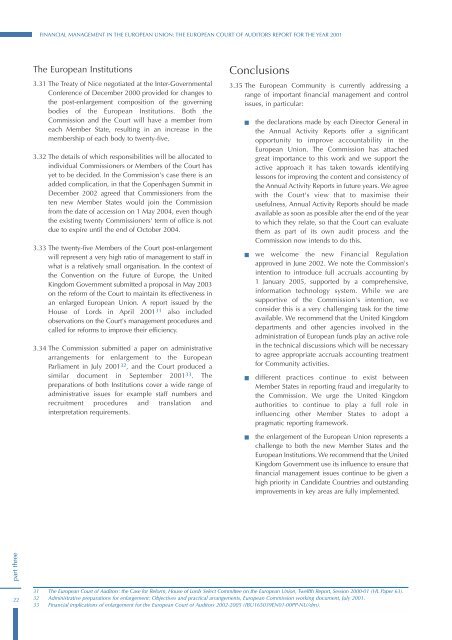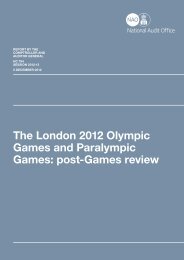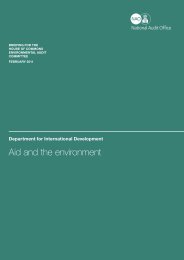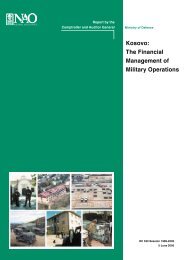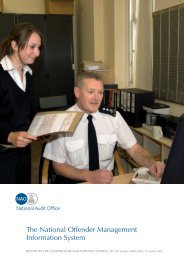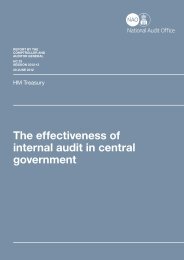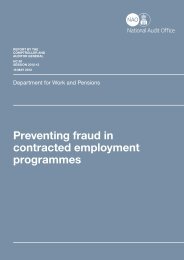Full report - National Audit Office
Full report - National Audit Office
Full report - National Audit Office
You also want an ePaper? Increase the reach of your titles
YUMPU automatically turns print PDFs into web optimized ePapers that Google loves.
FINANCIAL MANAGEMENT IN THE EUROPEAN UNION: THE EUROPEAN COURT OF AUDITORS REPORT FOR THE YEAR 2001<br />
The European Institutions<br />
3.31 The Treaty of Nice negotiated at the Inter-Governmental<br />
Conference of December 2000 provided for changes to<br />
the post-enlargement composition of the governing<br />
bodies of the European Institutions. Both the<br />
Commission and the Court will have a member from<br />
each Member State, resulting in an increase in the<br />
membership of each body to twenty-five.<br />
3.32 The details of which responsibilities will be allocated to<br />
individual Commissioners or Members of the Court has<br />
yet to be decided. In the Commission's case there is an<br />
added complication, in that the Copenhagen Summit in<br />
December 2002 agreed that Commissioners from the<br />
ten new Member States would join the Commission<br />
from the date of accession on 1 May 2004, even though<br />
the existing twenty Commissioners' term of office is not<br />
due to expire until the end of October 2004.<br />
3.33 The twenty-five Members of the Court post-enlargement<br />
will represent a very high ratio of management to staff in<br />
what is a relatively small organisation. In the context of<br />
the Convention on the Future of Europe, the United<br />
Kingdom Government submitted a proposal in May 2003<br />
on the reform of the Court to maintain its effectiveness in<br />
an enlarged European Union. A <strong>report</strong> issued by the<br />
House of Lords in April 2001 31 also included<br />
observations on the Court's management procedures and<br />
called for reforms to improve their efficiency.<br />
3.34 The Commission submitted a paper on administrative<br />
arrangements for enlargement to the European<br />
Parliament in July 2001 32 , and the Court produced a<br />
similar document in September 2001 33 . The<br />
preparations of both Institutions cover a wide range of<br />
administrative issues for example staff numbers and<br />
recruitment procedures and translation and<br />
interpretation requirements.<br />
Conclusions<br />
3.35 The European Community is currently addressing a<br />
range of important financial management and control<br />
issues, in particular:<br />
■<br />
■<br />
■<br />
the declarations made by each Director General in<br />
the Annual Activity Reports offer a significant<br />
opportunity to improve accountability in the<br />
European Union. The Commission has attached<br />
great importance to this work and we support the<br />
active approach it has taken towards identifying<br />
lessons for improving the content and consistency of<br />
the Annual Activity Reports in future years. We agree<br />
with the Court's view that to maximise their<br />
usefulness, Annual Activity Reports should be made<br />
available as soon as possible after the end of the year<br />
to which they relate, so that the Court can evaluate<br />
them as part of its own audit process and the<br />
Commission now intends to do this.<br />
we welcome the new Financial Regulation<br />
approved in June 2002. We note the Commission's<br />
intention to introduce full accruals accounting by<br />
1 January 2005, supported by a comprehensive,<br />
information technology system. While we are<br />
supportive of the Commission's intention, we<br />
consider this is a very challenging task for the time<br />
available. We recommend that the United Kingdom<br />
departments and other agencies involved in the<br />
administration of European funds play an active role<br />
in the technical discussions which will be necessary<br />
to agree appropriate accruals accounting treatment<br />
for Community activities.<br />
different practices continue to exist between<br />
Member States in <strong>report</strong>ing fraud and irregularity to<br />
the Commission. We urge the United Kingdom<br />
authorities to continue to play a full role in<br />
influencing other Member States to adopt a<br />
pragmatic <strong>report</strong>ing framework.<br />
■<br />
the enlargement of the European Union represents a<br />
challenge to both the new Member States and the<br />
European Institutions. We recommend that the United<br />
Kingdom Government use its influence to ensure that<br />
financial management issues continue to be given a<br />
high priority in Candidate Countries and outstanding<br />
improvements in key areas are fully implemented.<br />
part three<br />
22<br />
31 The European Court of <strong>Audit</strong>ors: the Case for Reform, House of Lords Select Committee on the European Union, Twelfth Report, Session 2000-01 (HL Paper 63).<br />
32 Administrative preparations for enlargement: Objectives and practical arrangements, European Commission working document, July 2001.<br />
33 Financial implications of enlargement for the European Court of <strong>Audit</strong>ors 2002-2005 (IBU165039EN01-00PP-NU/dm).


